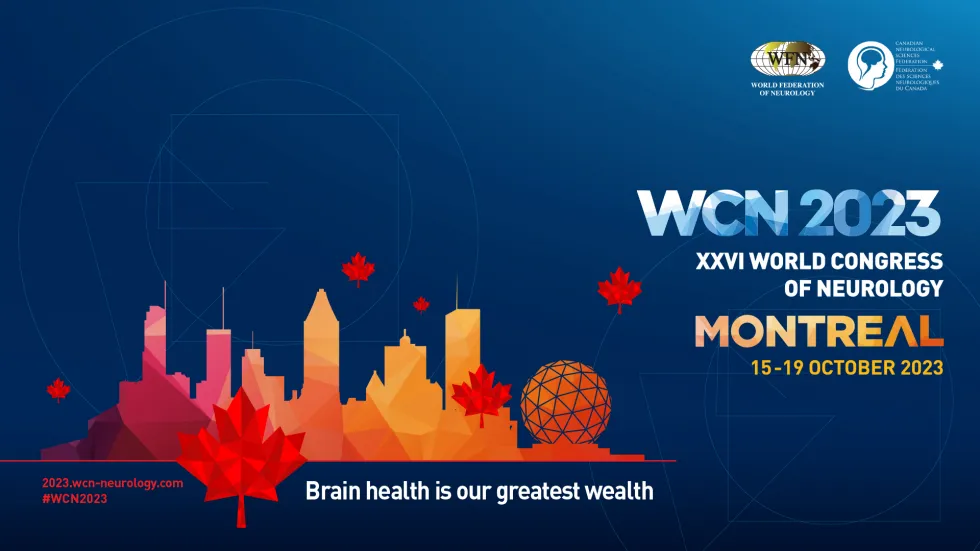
MONTREAL, Oct. 16, 2023 – Among U.S. adults who have had COVID-19, a staggering 28% report having experienced long COVID complications, and the CDC estimates that long COVID currently impacts 6% of the population. Despite the prevalence of long COVID, researchers still don't understand the full scope of COVID-19's impact on the brain.
Dr. Hadi Manji, consultant neurologist and honorary associate professor at the National Hospital for Neurology, United Kingdom, shed light on links between long COVID and similar neurological consequences of recent pandemics. Manji showed that long-term neurological complications like HIV-associated neurocognitive disorder (HAND), encephalitis lethargica and long COVID are following global outbreaks and often share key causes and biological processes, including viral persistence, persistent inflammation and antibody-mediated disorders.
“While the peak of the COVID-19 pandemic may be behind us, the ramifications are far from over, and millions continue to suffer from disabling complications like long COVID," says Manji. "The knowledge gained from past pandemics will undoubtedly inform our understanding, diagnosis, and treatment of present and future pandemic-related complications.”
The Neurological Impact of Pandemics
Manji emphasizes the neurological impacts of the 1918 influenza pandemic, encephalitis lethargica, HIV/AIDS, the Zika virus outbreak in 2014 and the current COVID-19 pandemic. Each of these pandemics resulted in neurological complications that impacted millions of people and had profound global impacts on disability and mortality, including post-encephalitic Parkinsonism, HAND, congenital brain damage due to in-utero Zika infection, and the recently emerging long COVID.
Some of the key pathophysiological mechanisms responsible for neurological syndromes like HIV-associated neurocognitive disorder (HAND) and long COVID include:
- Neuro-invasion
- Immune dysregulation
- Cytokine storms
- Inflammatory cell invasion
- Immunosuppression (especially significant in HIV cases)
- Hypoxia
- Ischaemia
Post-pandemic neurological complications are often further compounded by sepsis, metabolic derangements and coagulopathies, all of which were evident during the early stages of the COVID-19 pandemic.
The Worldwide Impact of Pandemics on Neurological Health
Pandemics will continue to occur, and Manji argued that understanding the underlying mechanisms of long-term post-infection neurological complications is crucial for finding appropriate treatments and reducing global disability.
"Let me emphasize that many of these pandemic-triggering pathogens, whether directly or indirectly, exact a toll on the human nervous system," says Manji. "These effects often evade timely diagnosis but have the potential to inflict significant disability and prolonged suffering."
Currently, long COVID impacts around 65 million people. HAND affects around 16 million HIV-infected individuals worldwide. Additionally, HIV is a significant risk factor for stroke, which is the leading cause of neurological morbidity and mortality.
Visit wcn-neurology.com to learn more about Dr. Manji and all the featured research at this year's WCN.
About the World Congress of Neurology
The World Federation of Neurology’s World Congress of Neurology brings together leading neuroscientists and public health experts to turn research into action and emphasize the importance of brain health across the globe. The 26th biennial conference was held in Montreal from October 15 to 19, 2023, and was co-hosted by the Canadian Neurological Society (CNS).
About the World Federation of Neurology
With support from its 124 national Member Societies, the World Federation of Neurology fosters quality neurology and brain health worldwide by promoting neurological education and training, emphasizing under-resourced areas of the world. As a non-state actor in official relations, WFN supports the World Health Organization (WHO) efforts to give everyone an equal chance to live a healthy life. With Member Societies around the globe, WFN unites the world’s neurologists to ensure quality neurology and advocate for people to have better brain health. Learn more about the World Federation of Neurology at wfneurology.org.
Media Contact
Ryan Pollock, Yakkety Yak
ryan@yakketyyak.com







